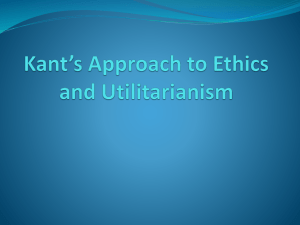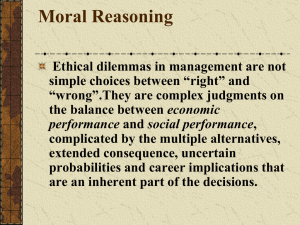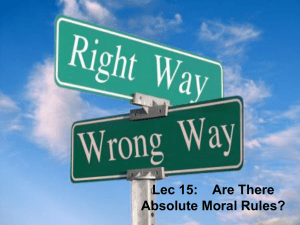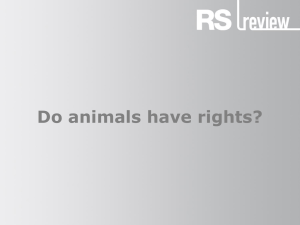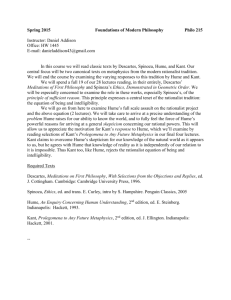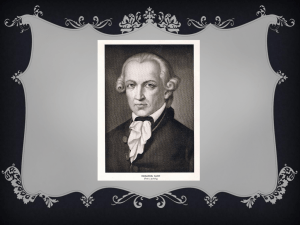The Book is: Archetypes Of Wisdom/ An Introduction To Philosophy
advertisement
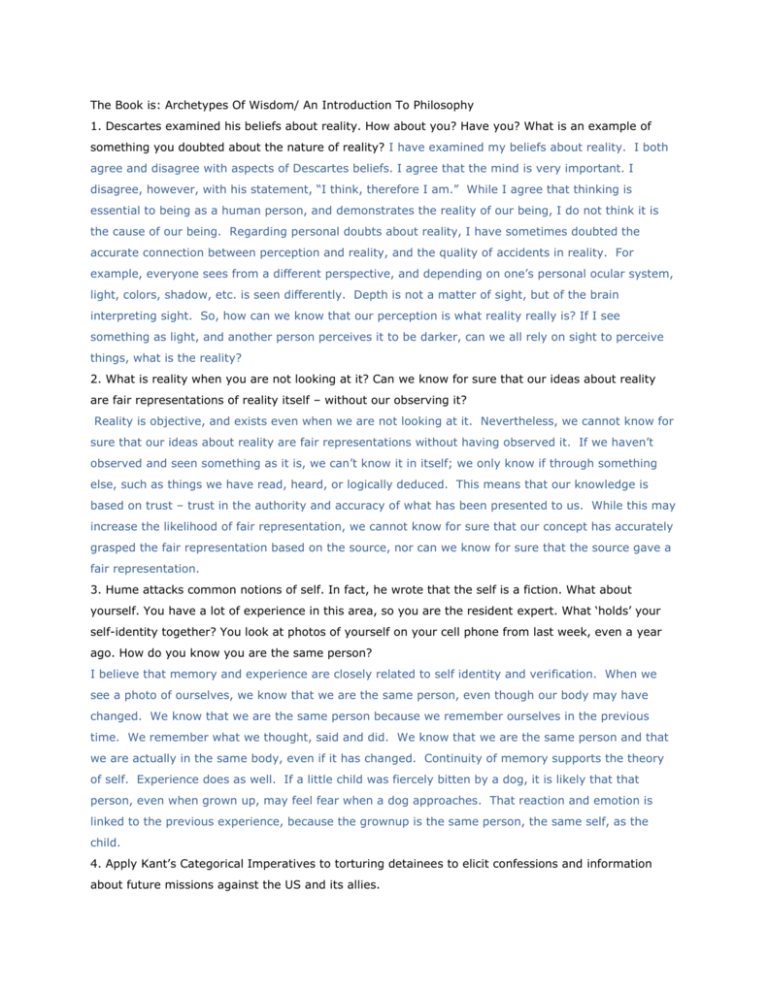
The Book is: Archetypes Of Wisdom/ An Introduction To Philosophy 1. Descartes examined his beliefs about reality. How about you? Have you? What is an example of something you doubted about the nature of reality? I have examined my beliefs about reality. I both agree and disagree with aspects of Descartes beliefs. I agree that the mind is very important. I disagree, however, with his statement, “I think, therefore I am.” While I agree that thinking is essential to being as a human person, and demonstrates the reality of our being, I do not think it is the cause of our being. Regarding personal doubts about reality, I have sometimes doubted the accurate connection between perception and reality, and the quality of accidents in reality. For example, everyone sees from a different perspective, and depending on one’s personal ocular system, light, colors, shadow, etc. is seen differently. Depth is not a matter of sight, but of the brain interpreting sight. So, how can we know that our perception is what reality really is? If I see something as light, and another person perceives it to be darker, can we all rely on sight to perceive things, what is the reality? 2. What is reality when you are not looking at it? Can we know for sure that our ideas about reality are fair representations of reality itself – without our observing it? Reality is objective, and exists even when we are not looking at it. Nevertheless, we cannot know for sure that our ideas about reality are fair representations without having observed it. If we haven’t observed and seen something as it is, we can’t know it in itself; we only know if through something else, such as things we have read, heard, or logically deduced. This means that our knowledge is based on trust – trust in the authority and accuracy of what has been presented to us. While this may increase the likelihood of fair representation, we cannot know for sure that our concept has accurately grasped the fair representation based on the source, nor can we know for sure that the source gave a fair representation. 3. Hume attacks common notions of self. In fact, he wrote that the self is a fiction. What about yourself. You have a lot of experience in this area, so you are the resident expert. What ‘holds’ your self-identity together? You look at photos of yourself on your cell phone from last week, even a year ago. How do you know you are the same person? I believe that memory and experience are closely related to self identity and verification. When we see a photo of ourselves, we know that we are the same person, even though our body may have changed. We know that we are the same person because we remember ourselves in the previous time. We remember what we thought, said and did. We know that we are the same person and that we are actually in the same body, even if it has changed. Continuity of memory supports the theory of self. Experience does as well. If a little child was fiercely bitten by a dog, it is likely that that person, even when grown up, may feel fear when a dog approaches. That reaction and emotion is linked to the previous experience, because the grownup is the same person, the same self, as the child. 4. Apply Kant’s Categorical Imperatives to torturing detainees to elicit confessions and information about future missions against the US and its allies. Based on Kant’s Categorical Imperatives, the results or consequences of an action, even when harmful, are irrelevant to morality. Morality is based on intention and principle. If someone acts on a principle because it is a right thing to do, the action becomes OK regardless of its consequences. Based on this, one should only act on categorical imperatives, or principles that can be universally applied. If a maxim such as “it is just to elicit confidential information for the sake of saving lives” is being used, then based on Kant’s theory, torturing detainees could be justified. 5. Be a utilitarian about an issue of your choice. Argue as John Stuart Mill. Stuart Mill’s utilitarianism is based on the concept that actions are good to the extent that they promote happiness. Happiness of the higher faculties is more important than happiness of the lower faculties. Since usefulness is a happiness of the higher faculty, utilitarianism often comes down to a question of the usefulness of an object. Since different people may have different values and concepts of usefulness, the morality of an object becomes determined by its usefulness for the greatest number of people. Applying this to an issue, we can see that lowering taxes, for example, is a good policy because it is useful to a large number of people. Even though lowering taxes can be harmful for some, it brings financial relief and opens new opportunities in terms of consumerism and education for many people, consequently resulting in happiness. Therefore, in spite of controversy, lowering taxes is useful. 6. Does Marxism have relevancy to today’s post-industrial societies? People in many countries could stand to lose more than their chains, so does it make sense to revolt against the capitalist societies in which all or most of us live? Since there continues to be division of classes in most countries, the Marxist ideal of equality still has relevance. The Marxist concept, however, of the revolt of the masses does not have relevance, for two reasons. First of all, it has been shown not to solve the problem and lead to equality, but to further stress and foster the division among classes. Rather than leading to an equal society, implantation of Marxism has been seen to simply change who is in the elite and authoritative class, not eliminating the discrepancy. Furthermore, revolution among the classes to lead to a classless society only makes sense if classes are fixed. Today, it is possible to pass from one class to another through hard work, ingenuity, etc. Since the classes aren’t as strictly defined, and lower classes are able to rise higher, it doesn’t make sense to neutralize all classes, which would take away the possibility of a better future. 7. Karl Marx wrote much about alienation in capitalist society, since he thought it was its distinctive feature. Are people today alienated from their work? Give an example of species-life. The theory of alienation states that workers, who have little control or ownership over their own work, will come to have little ownership over their lives as well. Workers don’t have control over their own actions because control lies with the capitalist owners, who direct them and make their decisions for them. Alienation does continue today, and can be seen most clearly through the exploitation of illegal immigrants or foreign labor for the sake of cheap labor. These men and women, who are desperate for a livelihood become completely dependent on their employer, and have no control over their work, hours of labor, or conditions due to their dependency on receiving their wage, which is usually unjustly low. Alienation of illegal Mexican immigrants in terms of agricultural or factory work in the United States is an example. 8. Most Americans think they believe in God and are religious folk. What would Kierkegaard say if given a chance? How is this tied up with living an authentic life full of meaning? Most Americans think that they believe in God and are religious, but this belief means nothing in life and does not direct their life. Kierkegaard would say that this is not real faith. Real faith involves personal passion and action. It must affect one’s choices. This is connected to living an authentic life full of meaning because, according to Kierkegaard and his theory of angst, each choice made in this life is connected to eternity and therefore determines one’s future. True faith in Christianity includes paradoxes which must be accepted not with reason, but with faith, even faith in the absurd. As a result, the faith of many Americans, which is often either too rationalistic, too static, or too disconnected from life choices, would not be considered true faith and religion by Kierkegaard. 9. Illustrate the pragmatic theory of meaning with your own example. The concept of motherhood can be used to apply the pragmatic theory of meaning, which implies that the meaning of a concept includes all of the consequences and other elements related to the concept. Motherhood, the, includes pain, childbearing, nursing, educating, raising the children, etc. The concept of motherhood, therefore, cannot be narrowed to the simple fact of woman with a child; it includes all of the consequences linked to it. 10. Friedrich Nietzsche foretold the death of God in a world based on an optimistic belief in scientific and technological progress. Most, he thought, as not courageous enough to admit this death. Further, he predicted that we would also lose faith in science and technology, leaving us with nothing. Was he right? If he is, then where do we go from here? First of all, I disagree with Nietzsche’s belief about the death of God. Belief in God still prevails in the world; the majority of people believe in God, whether as Muslim, Christian, Jewish, or Buddhist. A greater being is acknowledged and believed in. This has not changed. Man naturally believes in something greater than himself, on the basis of realizing the basic principle that something less cannot come from something greater. Therefore, something greater than man must exist. This also gives man hope when he faces his own weakness: there is something greater out there. Whether man idolizes God, science, technology or money, something is leading his life and determining his actions. If God is rejected, and science and technology fall through as well, man has two choices. Either, he will be led to absolute despair at finding nothing greater than himself and knowing that he is incapable of overcoming his own flaws, or he will find something greater than himself in which to place his hope. This may take on a different name or form, but man will be back to the beginning with faith in something, God under a different name, or some other form of power. 11. What was Descartes’ proposal, and how did his Scholastic education influence it? Descartes proposal states hypothesizes that the world was once chaos and came to being in a very different form than it is today. It has passed through various stages, and the only permanent elements are the laws God established. These laws caused it to gradually evolve into its current form. Descartes proposal is, in part, a reaction against his scholastic education, which disappointed him. It is a reaction against the traditional Christian and scriptural understanding of the manner in which God created the world and has sustained it. Nevertheless, his conclusions also reflect his Scholastic education, maintaining the transcendence of God and the supremacy of Divine Law. 12. How is skepticism important to Cartesian philosophy? Skepticism is one of the foundational cornerstones of Cartesian philosophy. Descartes sought to defeat and overcome skepticism by beginning with it and working through it. Descartes begins by doubting everything, including God, evidence and logic. He then falls back on the guarantee of personal existence, which can be known by the fact that one thinks. This gives rise to his famous “I think therefore I am claim,” and everything else is built off of that. 13. Can the Evil Genius refute the cogito? Is there any way to “refute” the cogito? The Evil Genius theory gives rise to serious doubt, but does not refute the cogito. Even if the Evil Genius has created man with flawed cognition, the fact that he has created him with cognition remains, and it is the cognition that enables one to say “I think therefore I am.” Nothing is able to refute the cogito. While something may exist without thinking, there is nothing that can think without existing, because the very presence of thought is in itself an existence. 14. How did Descartes answer the materialists’ rejection of free will? Materialists claim that there is no immaterial dimension to man, no immaterial soul, no psychological dimension that corresponds to freedom… Descartes, however, upholds free will. He applies his dualistic philosophy to the mind and other faculties. The will, therefore is able to be free as it is part of the immaterial dimension of man. Descartes identifies free will with choice. Beginning with the reality of choice, it is clear that man is free to do something or not to do something. He sees the will as being free by its nature, and therefore unable of being constrained. 15. Outline the development of the “epistemological turn” from Descartes through Locke and Berkeley to Hume? The epistemological turn marked a change in focus from ontology, or being, to epistemology, or knowledge. The epistemological turn is often credited as having been started by Descartes. Descartes retained some ontological perspectives and theories, regarding God, freedom, etc., but changed the method with which he justified these and other ideas, relying on rationalism alone. This rationalistic method would lead to the ultimate shift from ontology to epistemology, as even philosophers who would disagree with Descartes conclusion would embrace his method. The empiricists – Locke and Berkeley, disagreed with Descartes’ use of abstraction, and propagated the theory that all knowledge must come through the senses. This is the basis of Locke’s tabula rasa theory, which shows all human minds as being a blank slate in the beginning, and then being filled and formed by knowledge (not already formed by being…). Again, the emphasis is on knowledge, epistemology. Liebniz took Descartes’ principles on truth and certainty, and drew them further into the epistemological realm by applying logical criteria to them, rather than the psychological criteria Descartes had used. Humes built off of Locke, focusing more on the source of knowledge (the senses), than on the knowledge itself. He attacked metaphysics and causality, claiming that they are assumed, but not proven. This undermining of causality makes knowledge rely even more on empiricism (observation, sense knowledge), than on logic, because causes might not be accurately perceived by logic, and might not exist. Finally, Kant reacts against the skepticism of the empiricists, and reverts back to Descartes reliance on the primacy of thinking or consciousness. He rejects, however, the idea that subjective knowledge is primary, and claims that the mind is categorized (cause, effect, plurality, unity, etc.), and all of reality is seen and perceived through those categories. By the end of this development, which lasted about a century, many different theories of knowledge had been put forward, but all of them had consistently turned away from ontology to embrace epistemology. 16. What is the tabula rasa? What is its significance to Locke’s empiricism? As mentioned above, the tabula rasa refers to the idea that when man is born, he is a blank slate, with no pre-formed tendencies, concepts, etc. It is observation and knowledge, particularly through the senses, that forms man. This is significant in Locke’s empiricism because it emphasizes the role of the sense, or perceived, demonstrable knowledge, in philosophy and man’s understanding of the world. 17. Why is the distinction between impressions and ideas important to Hume’s philosophy? For Hume, impressions are perceptions that involve the senses; ideas are perceptions that come from thought prior to experience or sensory confirmation. This is important, because according to Hume’s philosophy, even idea relies on a previous impression that is remembered and brought back. In this sense, all ideas are ultimately seen as being linked to sensory knowledge, thus confirming the primary role of the senses as upheld by empiricists. 18. Sketch Hume’s analysis of cause and effect? Belief and knowledge can reach beyond present impressions and memory – into the past and future – only by means of cause and effect. However, each idea is distinct from the other, based on previous impressions. There is no self-evident relation; connections are drawn through observing similar cases. As a result, cause can never be proven. We learn based on the past, but there is never proof that the past is related to the present and future cases. 19. Why did Kant think it necessary to posit the existence of the noumenal world? Positing the existence of the noumenal world was necessary in order to establish the right boundaries of reason. Phenomena is everything that is observed by the five senses. Kant saw the efforts to describe noumena, or that which exists outside of the senses, as a means of describing or categorizing phenomena. These categories are the sum of human reasoning. The establishment of noumena is therefore necessary in order to fully understand human reasoning. 20. Describe the moral dimension as Kant understood it. Morality is based on the categorical imperative, or the act of carrying out principles that can be universally rightly applied. Moral philosophy, according to Kant, is finding the base principle of a moral metaphysics. Ultimately, Kant’s foundational moral rests on moral agreement or general judgment. In practice, Kant’s morality is duty oriented. Based on categorical imperatives, one has the duty to act in a certain way. This action is moral not only by corresponding to the right action that should be done, but by having a good intention that accompanies the act – doing it for the right reason. 21. What is a good will, according to Kant, and why does he claim that the only thing good in itself is a good will? A good will refers to a person (rational being) who always has the right motive. The right motive is to do the right thing, or to do one’s duty. According to Kant, the only good thing in itself is a good will, because evil is seen as a mistake in reasoning or error in logic. As a result, even a good action could be evil if it is not done with a good will (right intention), because it would be the result of mistaken reasoning. Right reasoning always leads to doing things for the right reason, which is the same as Kant’s concept of good will. While other good actions may have a certain quality to them, they are not good in themselves due to the faulty reasoning. 22. What is a Maxim? What makes a maxim moral in Kantian term? For Kant, a maxim refers to law, a law personally embraced (my law, for me…) and universal law. A maxim is moral when it comes from an individual with a Good Will. One should only act according to a maxim that can be universally applied. Such a maxim is moral. 23. What Kantian problem was Rawls addressing with his theory of justices? What did Rawls offer as an alternative? Kant’s morality and concept of Categorical Imperatives and maxims would imply that justice and morality depend completely on people of good will, and that all morality, all laws can be applied universally. This does not square completely with reality, and specifically with the reality of social law and the social contract theory, in which different interpretations are subjected to a common law for the sake of the greater good. Individuality in morals is implied for such a system to be needed. Furthermore, many civil laws are not based on universal maxims, but on organization, etc. In his theory of justice, Rawls constructs a philosophical theory that seeks to preserve the social contract theory and reconcile freedom and justice. He offers the “original position” theory as an alternative to Kant. Based on the “original position,” people chose principles, but these are chosen behind a “veil of ignorance,” not on universal imperatives. Rawls believes that this ignorance of details will lead to laws that are fair to all people. He then offers two principles of justice. The first states that all people will have equal right to equal basic liberties. The second states that inequalities will be arranged to benefit the members of society who are at a disadvantage, and that offices will be given on the basis of equal and just opportunity. 24. Identify and discuss some of social and economic factors the influenced Bentham’s development of simple utilitarianism. Bentham, a lawyer, was frustrated with English law, which he thought was complex and ineffective. He also disliked the prison system. Bentham issued a response to the U.S Declaration of Independence on behalf of England, but later supported the French Revolution. All of these events and dealings made Bentham well aware of the injustice and ineffectiveness of British society, specifically, and European society at large. He saw this ineffectiveness in the justice system, the legal system, the economic system, and the governance system. As a result, he developed his theory of utilitarianism, which would be a simple philosophy, easily applied, and would favor the good of the majority (the people). Utilitarianism would uphold whatever led to the greatest good and pleasure of the greatest number of people. 25. Apply Bentham’s hedonic calculus to a problem in your own life. Does doing so help you deal with it in a “scientific” way-or does it complicate the problem? If it complicates things, is this due to some flaw in the calculus or to its novelty? If one is in agreement with utilitarianism, hedonic calculus simplifies the problem. It provides an objective basis with which the extent to which an act is good (leads to pleasure), can be determined. It is, however, flawed and can lead to greater complication if one disagrees with utilitarianism, and believes that there are other ontological sources of morality. In such a case, things become complicated. If, for example, killing someone, will bring about great pleasure to one or many people, and only a little pain (or even it could be painless…) to the one who is killed, based on hedonic calculus, the action could be considered right. Based on other sources of morality, however, the act itself is an intrinsic evil, and will therefore never be right, regardless of the amount of pleasure it gives. As a result, the tension between the good (pleasure) and the evil make the situation more complicated. Based on hedonic calculus, the presence of suffering decreases the pleasure, but in the end, which wins out? Whichever is greater? Does one decide such a serious moral issue based on extent? These are questions that Bentham’s philosophy did not sufficiently address. 26. Did Bentham include animal in the moral domain? Why or Why not? Bentham did include animals in the moral domain. Bentham’s morality is based on pleasure and suffering, not on reasoning or will. Since animals can experience pain and suffer, they do fall within the moral domain and should have rights accordingly, according to Bentham. 27. How does Mill account for the predominance of lower pleasures? Do you agree? Why? Mill makes a distinction between higher pleasures and lower pleasures. He says that higher pleasures are of greater value, based on consensus. Nevertheless, he accounts for the predominance of the lower pleasures by saying that only pleasure and the absence of pain, which correspond to the lower pleasures, are of intrinsic worth. I disagree with the predominance of the lower pleasures, because these pleasures are part of instinct. They may be predominant in animals who, according to Mill count as beings due to their ability to feel pain/pleasure. People, however, have the capacity of animals, but also have something more – intellect and will (which make freedom), that Mill doesn’t address in his analysis of the pleasures. Man is able to be more controlled by his spirit – intellect and will – than by his instinct alone. As a result, this balance must be taken into account, and the higher pleasures that correspond to the higher faculties could be as strong or stronger than the lower pleasures. 28. Express Mill’s vision in your own words? Mill is an empiricist and utilitarian. He believes that the greatest happiness for the greatest number is the central moral principle. Happiness is equated with pleasure, which is divided into lower and higher pleasures. As a result, whatever brings the greatest pleasure for the greatest number is good. Although the higher pleasures may be of more value, only the lower pleasures have true intrinsic worth. Both animals and humans – all sentient beings – are included in this world of morality. Such morals do not come from self-evident principles and ethics, but from empirical evidence. Man is guided by his desires, and what conforms to his desires is good.

